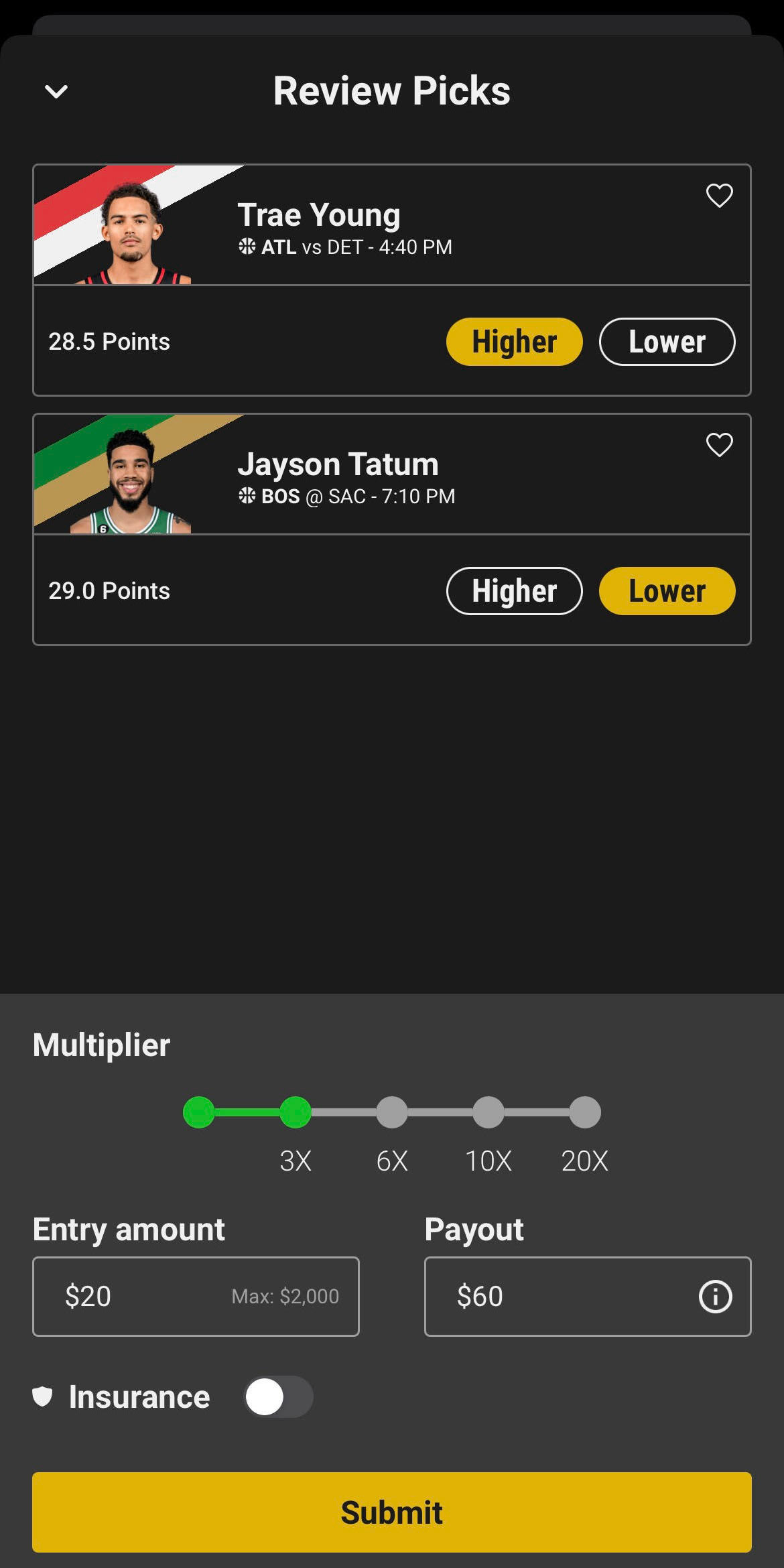The new wave of daily fantasy sports apps are actually gambling apps
That gambling may very well be legal as DFS or a game of skill everywhere it's offered, but it's still gambling
I am going to start this post by showing you two different apps where you try to predict player performances. Your challenge is to tell me the major difference between them.
In both cases, you are trying to predict how many points NBA players Trae Young and Jayson Tatum will score in their respective games.
Once you get past the UX differences between the two screenshots, you’ll probably realize there is little difference between them. You are making two predictions, putting real money behind those predictions, and you get a payout.
At least some of you will probably be surprised to learn that only one of these products is a parlay bet at a regulated US-facing sportsbook (DraftKings). The other is an “entry” at one of the apps that operates in 20+ states and offers what you see as a “daily fantasy sports contest” against the house (in this case, Underdog Fantasy).
“What are you talking about?” you’d say if you’re Pam from The Office:
Daily fantasy sports props = gambling
Let’s start here: I am not making a pronouncement about the legality of the daily fantasy prop apps like Underdog, PrizePicks, and others. They actually have a pretty good legal argument based on the combination of 1. the fantasy sports carveout in the federal Unlawful Internet Gambling Enforcement Act, 2. daily fantasy sports regulations that have popped up in a variety of states in the past decade and 3. state-level game of skill laws.
What I am telling you, is that legal arguments aside, is that you have a bunch of apps offering gambling to the public: never as a regulated sportsbook, sometimes as a regulated DFS app, and sometimes unregulated. If that sounds nuts to you, it is.
Let’s get this out of the way: YES, THERE IS SKILL IN PICKING PLAYER PROPS. There is also at least some skill in sports betting, traditional DFS, poker, and even some of the games you find at the casino other than slot machines. Let’s also note the age to play is 18, not 21, for these apps, in most states.
But if you look at these DFS props and tell me they aren’t gambling with a straight face, I’d say you’re not a very serious person. (Again, divorce the legal issues in play about if this is gambling, and look at the definition of gambling, which is to wager money on an uncertain outcome. We should all be able to agree there.)
I could have saved some time and just reprinted this op-ed I did for The Washington Post (https://www.washingtonpost.com/posteverything/wp/2015/10/13/daily-fantasy-sports-sites-say-their-users-arent-gambling-theyre-wrong/) back in 2015 and swapped out “DraftKings” and “FanDuel” with the names of the DFS prop sites. But I digress.
So why does it matter, Dustin?
I am often known as the fun police. “Can’t we just have our quote-unquote fantasy apps in states where sports betting isn’t legal yet, you curmudgeon” I am sure some people would think upon reading this.
I probably would have agreed several years ago when these sites were offering “contests” on how many “fantasy points” a player would score. But then they decided to push the envelope even more, offer parlay betting on player props, and become indistinguishable from their regulated sports betting counterparts.
And there’s the rub. In a world where the legal and regulated sports betting industry is increasingly facing re-regulation — namely pushback on advertising, increasing taxation, limits on how and where they can operate, etc. — these sites are all but immune to that backlash. They all also mostly operate in California, Texas and Florida — the three largest states in the union that also don’t have legal and regulated sports betting.
I said a reckoning was coming on Twitter, recently, and that may be wildly incorrect. I was going to make this post a lot longer and more complicated, but I wanted to focus on just one tenet. That DFS is being used as a cover to offer (probably legal) gambling across the US.
If everyone’s cool with that, so be it. I just wanted to deliver the message.







